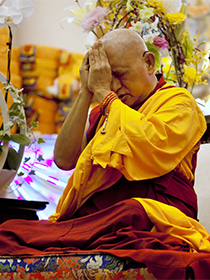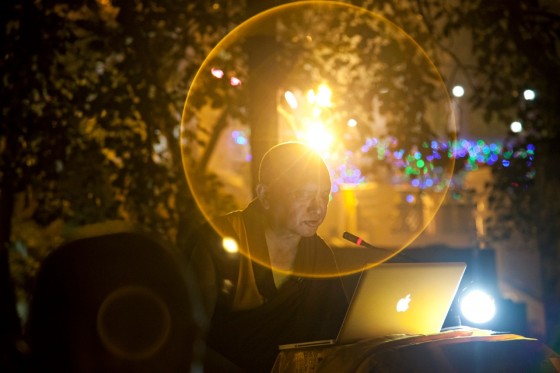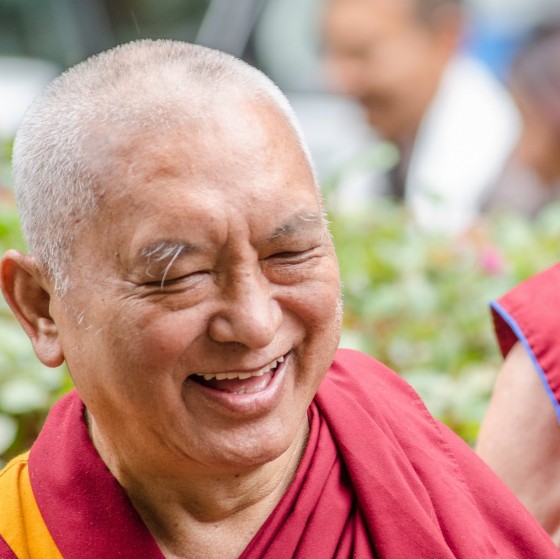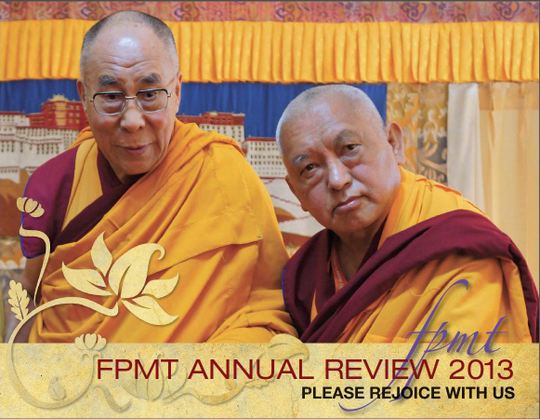- Home
- FPMT Homepage

Foundation for the Preservation of the Mahayana Tradition
The FPMT is an organization devoted to preserving and spreading Mahayana Buddhism worldwide by creating opportunities to listen, reflect, meditate, practice and actualize the unmistaken teachings of the Buddha and based on that experience spreading the Dharma to sentient beings. We provide integrated education through which people’s minds and hearts can be transformed into their highest potential for the benefit of others, inspired by an attitude of universal responsibility and service. We are committed to creating harmonious environments and helping all beings develop their full potential of infinite wisdom and compassion. Our organization is based on the Buddhist tradition of Lama Tsongkhapa of Tibet as taught to us by our founders Lama Thubten Yeshe and Lama Thubten Zopa Rinpoche.
- Willkommen
Die Stiftung zur Erhaltung der Mahayana Tradition (FPMT) ist eine Organisation, die sich weltweit für die Erhaltung und Verbreitung des Mahayana-Buddhismus einsetzt, indem sie Möglichkeiten schafft, den makellosen Lehren des Buddha zuzuhören, über sie zur reflektieren und zu meditieren und auf der Grundlage dieser Erfahrung das Dharma unter den Lebewesen zu verbreiten.
Wir bieten integrierte Schulungswege an, durch denen der Geist und das Herz der Menschen in ihr höchstes Potential verwandelt werden zum Wohl der anderen – inspiriert durch eine Haltung der universellen Verantwortung und dem Wunsch zu dienen. Wir haben uns verpflichtet, harmonische Umgebungen zu schaffen und allen Wesen zu helfen, ihr volles Potenzial unendlicher Weisheit und grenzenlosen Mitgefühls zu verwirklichen.
Unsere Organisation basiert auf der buddhistischen Tradition von Lama Tsongkhapa von Tibet, so wie sie uns von unseren Gründern Lama Thubten Yeshe und Lama Thubten Zopa Rinpoche gelehrt wird.
- Bienvenidos
La Fundación para la preservación de la tradición Mahayana (FPMT) es una organización que se dedica a preservar y difundir el budismo Mahayana en todo el mundo, creando oportunidades para escuchar, reflexionar, meditar, practicar y actualizar las enseñanzas inconfundibles de Buda y en base a esa experiencia difundir el Dharma a los seres.
Proporcionamos una educación integrada a través de la cual las mentes y los corazones de las personas se pueden transformar en su mayor potencial para el beneficio de los demás, inspirados por una actitud de responsabilidad y servicio universales. Estamos comprometidos a crear ambientes armoniosos y ayudar a todos los seres a desarrollar todo su potencial de infinita sabiduría y compasión.
Nuestra organización se basa en la tradición budista de Lama Tsongkhapa del Tíbet como nos lo enseñaron nuestros fundadores Lama Thubten Yeshe y Lama Zopa Rinpoche.
A continuación puede ver una lista de los centros y sus páginas web en su lengua preferida.
- Bienvenue
L’organisation de la FPMT a pour vocation la préservation et la diffusion du bouddhisme du mahayana dans le monde entier. Elle offre l’opportunité d’écouter, de réfléchir, de méditer, de pratiquer et de réaliser les enseignements excellents du Bouddha, pour ensuite transmettre le Dharma à tous les êtres. Nous proposons une formation intégrée grâce à laquelle le cœur et l’esprit de chacun peuvent accomplir leur potentiel le plus élevé pour le bien d’autrui, inspirés par le sens du service et une responsabilité universelle. Nous nous engageons à créer un environnement harmonieux et à aider tous les êtres à épanouir leur potentiel illimité de compassion et de sagesse. Notre organisation s’appuie sur la tradition guéloukpa de Lama Tsongkhapa du Tibet, telle qu’elle a été enseignée par nos fondateurs Lama Thoubtèn Yéshé et Lama Zopa Rinpoché.
Visitez le site de notre Editions Mahayana pour les traductions, conseils et nouvelles du Bureau international en français.
Voici une liste de centres et de leurs sites dans votre langue préférée
- Benvenuto
L’FPMT è un organizzazione il cui scopo è preservare e diffondere il Buddhismo Mahayana nel mondo, creando occasioni di ascolto, riflessione, meditazione e pratica dei perfetti insegnamenti del Buddha, al fine di attualizzare e diffondere il Dharma fra tutti gli esseri senzienti.
Offriamo un’educazione integrata, che può trasformare la mente e i cuori delle persone nel loro massimo potenziale, per il beneficio di tutti gli esseri, ispirati da un’attitudine di responsabilità universale e di servizio.
Il nostro obiettivo è quello di creare contesti armoniosi e aiutare tutti gli esseri a sviluppare in modo completo le proprie potenzialità di infinita saggezza e compassione.
La nostra organizzazione si basa sulla tradizione buddhista di Lama Tsongkhapa del Tibet, così come ci è stata insegnata dai nostri fondatori Lama Thubten Yeshe e Lama Zopa Rinpoche.
Di seguito potete trovare un elenco dei centri e dei loro siti nella lingua da voi prescelta.
- 欢迎 / 歡迎
简体中文
“护持大乘法脉基金会”( 英文简称:FPMT。全名:Foundation for the Preservation of the Mahayana Tradition) 是一个致力于护持和弘扬大乘佛法的国际佛教组织。我们提供听闻,思维,禅修,修行和实证佛陀无误教法的机会,以便让一切众生都能够享受佛法的指引和滋润。
我们全力创造和谐融洽的环境, 为人们提供解行并重的完整佛法教育,以便启发内在的环宇悲心及责任心,并开发内心所蕴藏的巨大潜能 — 无限的智慧与悲心 — 以便利益和服务一切有情。
FPMT的创办人是图腾耶喜喇嘛和喇嘛梭巴仁波切。我们所修习的是由两位上师所教导的,西藏喀巴大师的佛法传承。
繁體中文
護持大乘法脈基金會”( 英文簡稱:FPMT。全名:Found
ation for the Preservation of the Mahayana Tradition ) 是一個致力於護持和弘揚大乘佛法的國際佛教組織。我們提供聽聞, 思維,禪修,修行和實證佛陀無誤教法的機會,以便讓一切眾生都能 夠享受佛法的指引和滋潤。 我們全力創造和諧融洽的環境,
為人們提供解行並重的完整佛法教育,以便啟發內在的環宇悲心及責 任心,並開發內心所蘊藏的巨大潛能 — 無限的智慧與悲心 – – 以便利益和服務一切有情。 FPMT的創辦人是圖騰耶喜喇嘛和喇嘛梭巴仁波切。
我們所修習的是由兩位上師所教導的,西藏喀巴大師的佛法傳承。 察看道场信息:
- FPMT Homepage
- News/Media
-
- Study & Practice
-
-
- About FPMT Education Services
- Latest News
- Programs
- New to Buddhism?
- Buddhist Mind Science: Activating Your Potential
- Heart Advice for Death and Dying
- Discovering Buddhism
- Living in the Path
- Exploring Buddhism
- FPMT Basic Program
- FPMT Masters Program
- FPMT In-Depth Meditation Training
- Maitripa College
- Lotsawa Rinchen Zangpo Translator Program
- Universal Education for Compassion & Wisdom
- Online Learning Center
-
- Prayers & Practice Materials
- Overview of Prayers & Practices
- Full Catalogue of Prayers & Practice Materials
- Explore Popular Topics
- Benefiting Animals
- Chenrezig Resources
- Death & Dying Resources
- Lama Chopa (Guru Puja)
- Lama Zopa Rinpoche: Compendium of Precious Instructions
- Lama Zopa Rinpoche: Life Practice Advice
- Lama Zopa Rinpoche Practice Series
- Lamrim Resources
- Mantras
- Prayer Book Updates
- Purification Practices
- Sutras
- Thought Transformation (Lojong)
- Audio Materials
- Dharma Dates - Tibetan Calendar
- Translation Services
- Publishing Services
- Ways to Offer Support
- Prayers & Practice Materials
-
- Teachings and Advice
- Find Teachings and Advice
- Lama Zopa Rinpoche Advice Page
- Lama Zopa Rinpoche: Compendium of Precious Instructions
- Lama Zopa Rinpoche Video Teachings
- ༧སྐྱབས་རྗེ་བཟོད་པ་རིན་པོ་ཆེ་མཆོག་ནས་སྩལ་བའི་བཀའ་སློབ་བརྙན་འཕྲིན།
- Podcasts
- Lama Yeshe Wisdom Archive
- Buddhism FAQ
- Dharma for Young People
- Resources on Holy Objects
- Teachings and Advice
-
-
*If a menu item has a submenu clicking once will expand the menu clicking twice will open the page.
-
-
- Centers
-
- Teachers
-
- Projects
-
-
-
-
*If a menu item has a submenu clicking once will expand the menu clicking twice will open the page.
-
-
- FPMT
-
-
-
-
-
Each one of us is responsible for all other living beings’ happiness besides our own. As a result, your loving kindness is the most wish fulfilling thing in life, more precious than anything else in the world. That makes for a most satisfying, fulfilling life.
Lama Zopa Rinpoche
-
-
-
- Shop
-
-
-
The Foundation Store is FPMT’s online shop and features a vast selection of Buddhist study and practice materials written or recommended by our lineage gurus. These items include homestudy programs, prayers and practices in PDF or eBook format, materials for children, and other resources to support practitioners.
Items displayed in the shop are made available for Dharma practice and educational purposes, and never for the purpose of profiting from their sale. Please read FPMT Foundation Store Policy Regarding Dharma Items for more information.
-
-
Lama Zopa Rinpoche News
20
Lama Zopa Rinpoche’s Losar: A Report from Bodhgaya
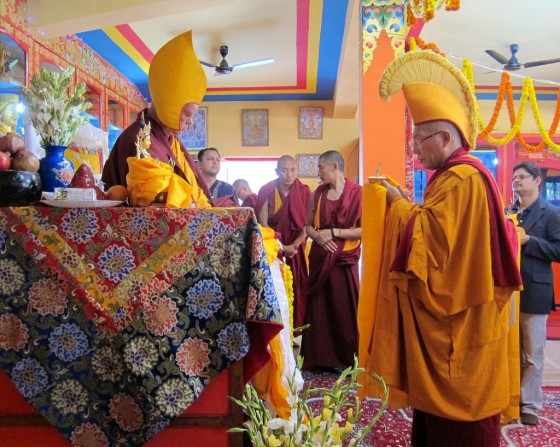
Lama Zopa Rinpoche and Dagri Rinpoche during long life puja on Losar, Root Institute, Bodhgaya, India, March 2014. Photo by Ven. Sarah Thresher.
By Ven. Sarah Thresher
Lama Zopa Rinpoche has been staying at Root Institute in Bodhgaya, India. Rinpoche has been engaged in many practices during Losar and the two weeks that follow. Ven. Sarah Thresher has been participating in these virtuous activities and shared this report.
Losar started very early morning with Yamantaka and Palden Lhamo prayers before dawn. Dagri Rinpoche stayed over at Root Institute to join Rinpoche for the prayers. Before dawn the monks served early morning Tibetan tea and kapse [fried bread].
After breakfast people began arriving for the long life puja for Lama Zopa Rinpoche requested by Dagri Rinpoche and Root Institute. Representatives from various Indian centers and the two Maitreya Projects – in Bodhgaya and Kushinagar – led Rinpoche into the gompa. Rinpoche went first to offer body, speech and mind to the decorated throne of His Holiness the Dalai Lama and then the throne of Lama Yeshe. This Losar was the 30th anniversary of Lama Yeshe’s passing away.
Dagri Rinpoche and Keutsang Rinpoche both took part in the puja along with several rows of monks from Sera Je Monastery. Even though Bodhgaya is not busy now, the gompa was full with people showing up from all over to pray for the guru’s long life. Following the tsog offering, Rinpoche took the microphone and began teaching. First he explained how important are these 15 days of Losar – the days that commemorate Buddha displaying miracles to subdue the Tirthika teachers – because at this time merit multiplies many 100 millions of times. Rinpoche commented that for “lazy” people like himself, it was an opportunity to make up for all the lost time of the rest of the year when no practice was done.
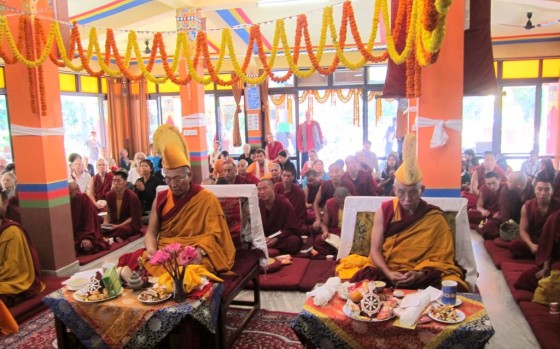
Dagri Rinpoche and Keutsang Rinpoche at Root Institute, Bodhgaya, India, March 2014. Photo by Ven. Sarah Thresher.
Rinpoche then continued with a beautiful talk about the qualities of Lama Yeshe and the importance of the guru. He quoted Padampa Sangye who advised, “Cherish the Guru more than the Buddha and realizations will come in this lifetime.” Rinpoche described some of the obvious qualities of Lama Yeshe – his always-loving aspect that attracted everyone to him, his humility, his wisdom – and explained that Lama was known by all to be a great scholar. Rinpoche then mentioned that Lama Yeshe was also a great yogi who had the tantric realizations of clear light and illusory body but that he hid these profound practices by meditating while lying down during his regular afternoon “nap.” Rinpoche said that whatever benefit the FPMT had been able to offer and however much we ourselves had been able to learn and practice, it was all due to Lama Yeshe’s kindness because it was Lama who set up the organization.
Then Rinpoche praised the director of Root Institute, Ven. Trisha, for her devotion to Buddha, Dharma, Sangha and compassion, which meant the center was harmonious and able to benefit sentient beings greatly.
Following the puja, lunch was offered on the lawn and the three lamas sat outside for a long leisurely lunch discussing Dharma.
In the afternoon, Rinpoche went to the Mahabodhi Stupa around 4 p.m. and stayed until 9 p.m.! This was the first day of the 15 days of thousands of light offerings made at the stupa by Root Institute, so Rinpoche first blessed and offered the lights. He then taught on motivation and how to circumambulate and led the group around the stupa before going to offer robes and bowls of fruit and flowers to the main Buddha statue along with Dagri Rinpoche and Keutsang Rinpoche. After making offerings and prayers in the main shrine, the three lamas sat under the Bodhi Tree, where they recited many more prayers and took the bodhisattva vows.
Rinpoche continued circumambulating while reading 40 pages of Lama Tsongkhapa’s Interpretable and Definitive Meaning (Lekshay Nyingpo) until the battery ran out on the flashlight. Along the way more and more people joined the circumambulation and Rinpoche would give spontaneous teachings. He pointed out one place where he used to sit and recite many prayers in the past. He also taught a young Tibetan girl who was prostrating around the stupa by doing short prostrations on the benefits of the full-length prostration.
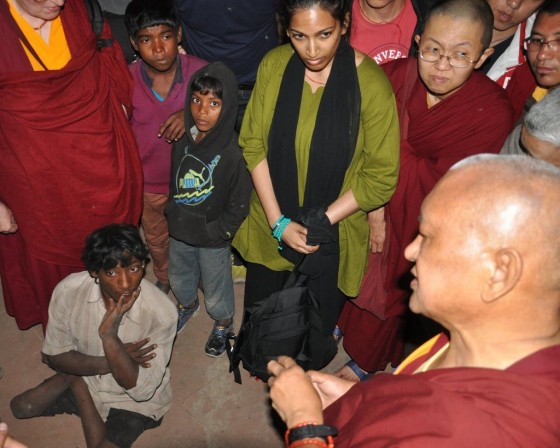
Lama Zopa Rinpoche teaching beggar, Bodhgaya, India, March 2014. Photo by Ven. Sarah Thresher.
As we were leaving the stupa, a beggar who had polio and could not walk came up to Rinpoche. Rinpoche asked him some questions and then began giving a long teaching (translated into Hindi by one of the students). He told the story about a boy in Nepal who had no arms but had managed to overcome his disability and graduate from Delhi University. Then Rinpoche taught the very essence of Dharma: how it is the mind that creates our sufferings and problems and the mind that creates happiness, therefore it is so important to transform the mind. And how positive actions bring happiness and harmful actions bring suffering. A crowd of Indians and beggars gathered around listening to Rinpoche’s skillful teaching. I have never seen any other lama teach the beggars in Bodhgaya before and this young man was obviously amazed by all the attention he was receiving.
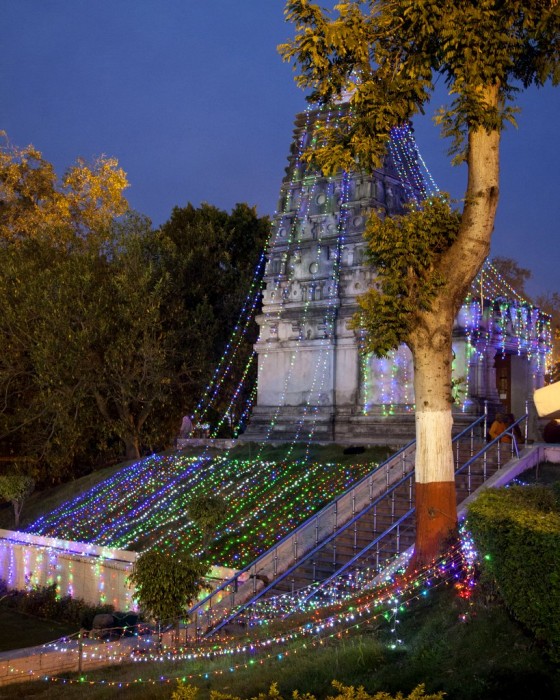
Light offerings at Mahabodhi Stupa, part of Root Institute’s Festival of Light and Merit, Bodhgaya, India, March 2014. Photo by Andy Melnic.
Read more from Ven. Sarah Thresher on Rinpoche’s activites during Monlam.
Learn more about Lama Zopa Rinpoche, spiritual director of the Foundation for the Preservation of Mahayana Tradition (FPMT), and Rinpoche’s vision for a better world. Sign up to receive news and updates.
- Tagged: losar, mahabodhi stupa, mandala, ven. sarah thresher
- 0
19
Offerings to Stupas
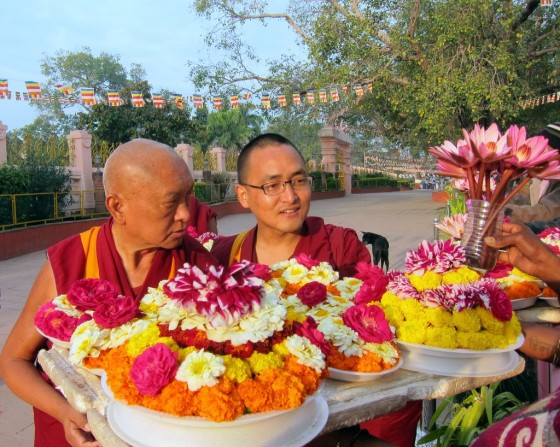
Lama Zopa Rinpoche buying extensive flower offerings at the Mahabodhi Stupa, Bodhgaya, India, February 2014. Photo by Ven. Sarah Thresher.
While staying in Bodhgaya, Lama Zopa Rinpoche has made frequent visits to the Mahabodhi Stupa, doing circumambulation, pujas and making offerings. In 2013, Rinpoche translated “Padmasambhava’s Instruction on Offerings to Stupas,” which details the benefits of prostrating to, circumambulating, making offerings, and offering service to stupas. The text, which Rinpoche would like to be used far and wide, is available from FPMT Education Services as a free booklet in several downloadable formats in English as well as in Italian.
Lama Zopa Rinpoche is the spiritual director of the Foundation for the Preservation of Mahayana Tradition (FPMT), an organization dedicated to preserving Mahayana Buddhism through offering the Buddha’s authentic teachings and to facilitating reflection, meditation, practice and the opportunity to actualize and directly experience the Buddha’s teachings. Sign up to receive news and updates.
For more on holy objects, visit FPMT Education Services’s page “Holy Objects.”
- Tagged: mandala, padmasambhava, stupas
- 0
18
Bringing Up Children to Have a Compassionate Nature
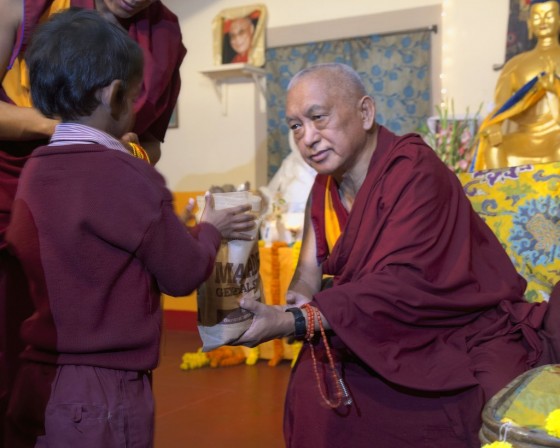
Lama Zopa Rinpoche offering gifts to children from Maitreya School and Tara Children’s Home at Root Institute, Bodhgaya, India, March 2014. Photo by Andy Melnic.
“The objective of a school is to bring up children so that they come to have a compassionate nature, and to have the quality of loving kindness in their minds, so that they grow up with the thought of universal responsibility. They need to have the idea, ‘I have the responsibility to free others from their problems and grow up having these qualities.’ That stops them from giving harm to others; they only benefit others. If we develop the mind in this life, then life to life, as the mind continues, of course it affects our future lives. So, from life to life there is benefit. The children are able to benefit all sentient beings, to bring them to liberation and enlightenment. Many people will not understand this, but this is our goal: to create less causes of suffering and to create more causes for happiness. It brings peace and happiness to the family, country, society, and world. …”
– Lama Zopa Rinpoche, from the “Educating Children” page
on the “Lama Zopa Rinpoche Online Advice Book”
Learn more about Lama Zopa Rinpoche, spiritual director of the Foundation for the Preservation of Mahayana Tradition (FPMT), and Rinpoche’s vision for a better world. Sign up to receive news and updates.
- Tagged: children, lama zopa rinpoche, mandala
- 0
17
Rinpoche Playing Cymbals [Video]
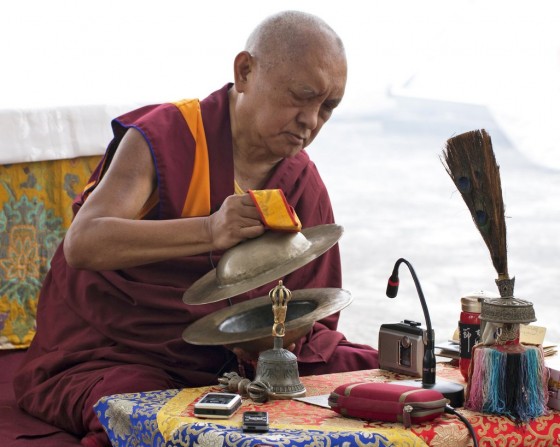
Lama Zopa Rinpoche playing cymbals, Root Institute, Bodhgaya, India, March 2014. Photo and video by Andy Melnic.
You can watch Lama Zopa Rinpoche playing cymbals during a Padmasambhava incense puja on the roof of Root Institute in Bodhgaya. Rinpoche has been staying in Bodhgaya during Monlam.

Lama Zopa Rinpoche doing puja with Sangha and lay students on the roof of Root Institute, Bodhgaya, India, March 2014. Photo by Andy Melnic.
More information, photos and updates about FPMT spiritual director Lama Zopa Rinpoche can be found on Rinpoche’s homepage. If you’d like to receive news of Lama Zopa Rinpoche via email, sign up to Lama Zopa Rinpoche News.
14
Rinpoche Offers Teaching to Children
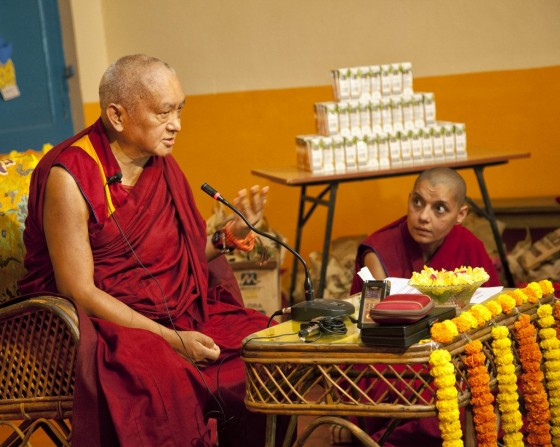
Lama Zopa Rinpoche teaching the children of Maitreya School and Tara Children’s Home with Ven. Samten interpreting into Hindi, Root Institute, Bodhgaya, India, March 2014. Photo by Andy Melnic.
Lama Zopa Rinpoche addressed all of the children from Maitreya School and Tara Children’s Home, both projects of Root Institute in Bodhgaya, India. Rinpoche talked with the children for two to three hours with Ven. Samten interpreting for Rinpoche into Hindi.
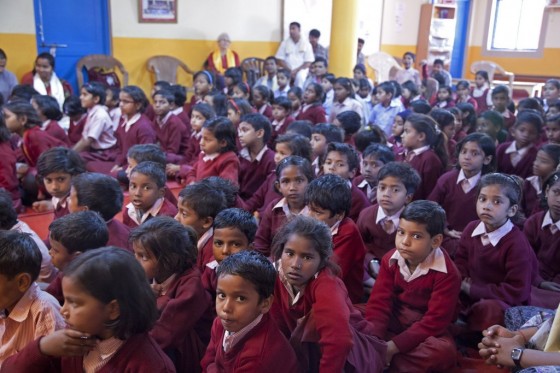
Children from Maitreya School and Tara Children’s Home at Root Institute, Bodhgaya, India, March 2014. Photo by Andy Melnic.
Tara Children’s Home offers a caring environment and home for orphaned children affected by HIV/AIDS. It is the only such home of its kind in the Indian state of Bihar. Currently, 22 children live at Tara Children’s Home.
Maitreya School offers children from Bodhgaya and surrounding villages an education aligned with the standard Indian curriculum as well as life skills of compassion, honesty and loving kindness, as taught by the 16 Guidelines, a program of Universal Education for Compassion and Wisdom. Currently, the Maitreya School is looking for volunteer teachers.
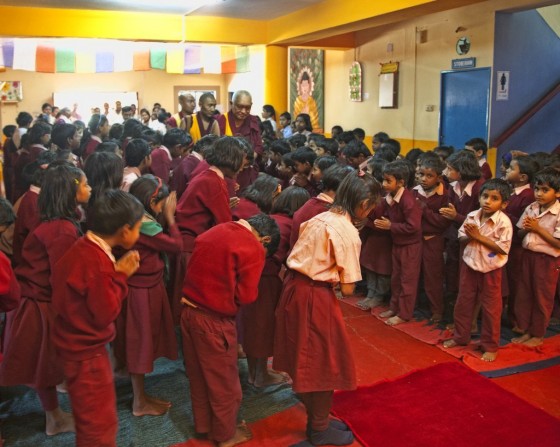
Lama Zopa Rinpoche being greeted by the children of Maitreya School and Tara Children’s Home, Root Institute, Bodhgaya, India, March 2014. Photo by Andy Melnic.
Learn more about FPMT spiritual director Lama Zopa Rinpoche and his beneficial activities by visiting Rinpoche’s homepage, where you will find links to Rinpoche’s schedule, new advice, recent video, photos and more.
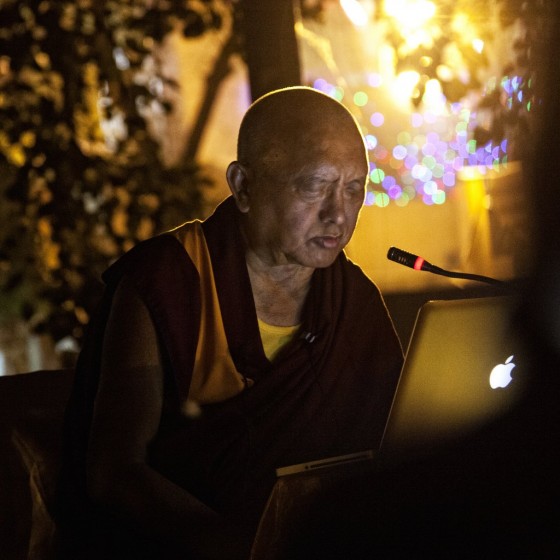
Lama Zopa Rinpoche reading the Sutra of Golden Light at Mahabodhi Temple, Bodhgaya, India, March 2014. Photo by Andy Melnic.
Our hearts and prayers go out to all the people on Malaysia Airlines flight 370 as well as all their families. FPMT spiritual director Lama Zopa Rinpoche recently gave advice on what we can do for the 239 people who were on the flight:
- To recite the Sutra of Golden Light mindfully and Medicine Buddha puja.
- In addition, to recite 100,000 Names of Buddha. As this is only in Tibetan, this recitation could be sponsored.
Lama Zopa Rinpoche is the spiritual director of the Foundation for the Preservation of Mahayana Tradition (FPMT), an organization dedicated to preserving Mahayana Buddhism through offering the Buddha’s authentic teachings and to facilitating reflection, meditation, practice and the opportunity to actualize and directly experience the Buddha’s teachings. Sign up to receive news and updates.
- Tagged: flying, lama zopa rinpoche, malaysia, mandala
- 0
11
The Happiest Losar
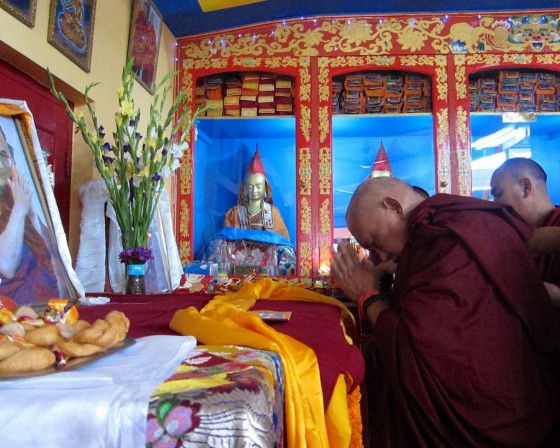
Lama Zopa Rinpoche offering body, speech and mind to the decorated throne of His Holiness the Dalai Lama on Losar, Root Institute, Bodhgaya, India, March 2014. Photo by Ven. Sarah Thresher.
By Ven. Sarah Thresher
Lama Zopa Rinpoche has been staying at Root Institute in Bodhgaya, India. Rinpoche has been engaged in many practices during the Days of Miracles, which comprise the two weeks after Losar. Ven. Sarah Thresher has been participating in these virtuous activities and shared this report.
After several weeks’ intensive retreat and the busy Losar celebration, today was an opportunity for Rinpoche to rest. The plan is to give transmission of the Sutra of Golden Light at the Mahabodhi Stupa and an excellent teaching site has been set up under a tree on the right side.
Rinpoche left for the stupa around 7:30 p.m. today, stopping first for chai at the Mahayana Guest House where he gave a short teaching on the powerful merit of making offerings to the pores of the guru. Rinpoche said that many Westerners think they have to send money to monasteries in order to create merit, but at the center when we make an offering of just a glass of water or cup of tea to students who share the same guru, it is more powerful than offering to all the Buddha, Dharma, Sangha, statues, stupas, scriptures and holy objects of the three times and ten directions.
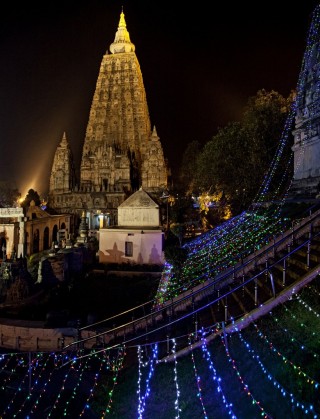
Light offerings at Mahabodhi Stupa, part of Root Institute’s Festival of Light and Merit, Bodhgaya, India, March 2014. Photo by Andy Melnic.
Ven. Dekyong, who requested transmission of the Sutra of Golden Light, came with incense to lead Rinpoche to the stupa. Rinpoche commented that all the staff should take turns to invite him to the transmission with incense because the benefits of doing so explained in the Sutra of Golden Light (chapter 7) are so great. However Rinpoche did not begin the transmission tonight even though people had been waiting seven hours at the stupa for it to begin. Instead he circumambulated and blessed the lights.
There are thousands of colored lights decorating the stupa right now as part of Root Institute’s Festival of Light and Merit (FLAM), in which light offerings are made in celebration of the four major buddha days. Rinpoche has commented several times how beautiful they are and has been personally reciting the offering prayer as he circumambulates. Tonight after the circumambulation was finished, Rinpoche talked for over an hour on the benefits of making offerings to holy objects, giving various examples of the extraordinary merit gained by offering even one light to the Buddha compared to offering universes filled with wish-granting jewels to numberless monks, arhats or bodhisattvas for many eons. Rinpoche also talked about the power of doing the prayers at the stupa together, since making prayers with others is far more powerful than reciting prayers alone in our own room. This is why in the monasteries they gather to do the pujas together. It is like trying to sweep a room with one straw or a bunch of straws.
Rinpoche concluded that we are so fortunate to be offering all these many thousands of lights every night to all the gurus, buddhas, bodhisattvas, statues, stupas, scriptures and holy objects. Rinpoche commented that this year the lights are the most beautiful he has seen. This is the happiest day, the happiest Losar, the happiest life to be offering all these lights!
After the dedication prayers, Rinpoche went to do puja for one sick Tibetan lady until midnight.
Learn more about Lama Zopa Rinpoche, spiritual director of the Foundation for the Preservation of Mahayana Tradition (FPMT), and Rinpoche’s vision for a better world. Sign up to receive news and updates.
- Tagged: golden light sutra, lama zopa rinpoche, losar, mahabodhi stupa, mandala, ven. sarah thresher
- 0
10
Sentient Beings’ Happiness Comes from Dharma
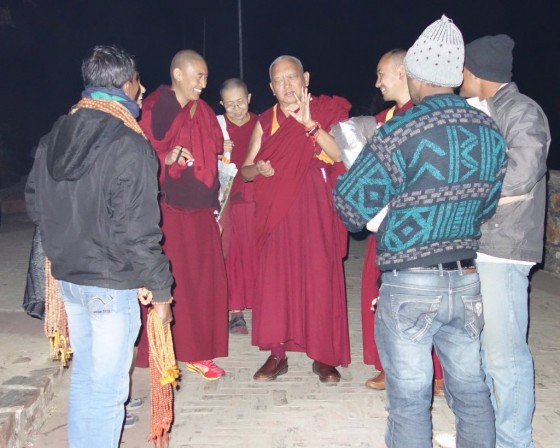
On the way down from Vulture’s Peak, Lama Zopa Rinpoche stops to give teachings to the local Indians who sell things, February 2014. Photo by Ven. Roger Kunsang.
“Happiness doesn’t mean just the pleasure of eating food, having comfort and a house, and just temporary pleasures. House, eating – not eating the house! The comfort of having money and all that – not just that. I think even that comes from Dharma. Even studying at kindergarten, primary school, then college or university – that’s just the outside condition. If the person has success, happiness, it all comes from merit, good karma, positive action. The intention, the mental factor that accompanies the principal consciousness. So that’s karma. Karma’s not outside; it’s one’s own mind. That happiness comes from virtuous actions, not non-virtue but virtue. So it came from Dharma. Happiness, even money, having comfort, came from Dharma, it came from virtuous action. Just now I described virtuous action, that is Dharma. People think happiness comes from money, but they don’t know what the cause of money is. They think making money is from going to kindergarten, from kindergarten to primary school, then college, university. This general belief you have is that that’s the main cause, but that’s just a condition. The minute you decide to get a job, the minute you get, you’re able to make money. But there are people who can’t find a job for years, even though they’re trying to get one. So those are conditions – they’re not the main cause. The main cause is merit. …”
– Lama Zopa Rinpoche, excerpted from “Dharma Essentials for Happiness,” a talk given at Amitabha Buddhist Centre, Singapore, March 7, 2013
Learn more about Lama Zopa Rinpoche, spiritual director of the Foundation for the Preservation of Mahayana Tradition (FPMT), and Rinpoche’s vision for a better world. Sign up to receive news and updates.
- Tagged: happiness, lama zopa rinpoche, mandala
- 0
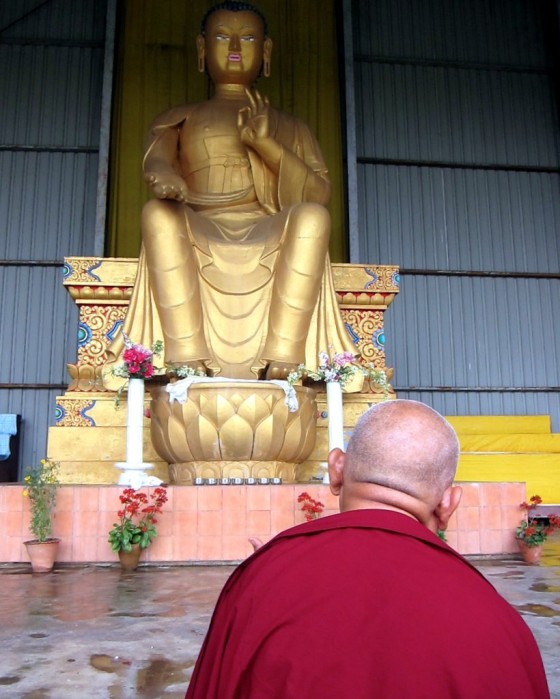
Lama Zopa Rinpoche doing prayers in front of the 24-foot Maitreya Buddha statue on the Maitreya Project land in Bodhgaya, India, February, 2014. Photo by Ven. Sarah Thresher.
While Rinpoche has been staying in Bodhgaya, he visited Maitreya Project land and offered prayers with members of the Maitreya team. Rinpoche has written a letter explaining that there are now two Maitreya Projects. For more, see this announcement.
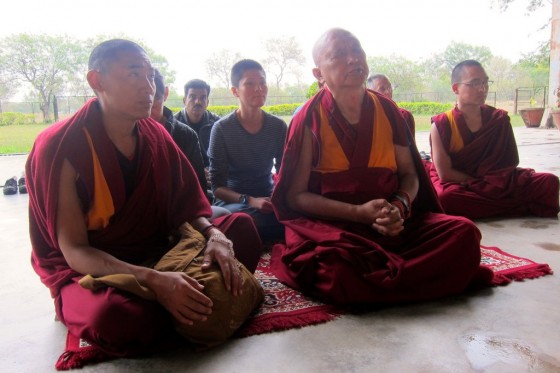
Lama Zopa Rinpoche doing prayers in front of the 24-foot Maitreya Buddha statue on Maitreya Project land in Bodhgaya, India, February 2014. Photo by Ven. Sarah Thresher.
Learn more about Lama Zopa Rinpoche, spiritual director of the Foundation for the Preservation of Mahayana Tradition (FPMT), and Rinpoche’s vision for a better world. Sign up to receive news and updates.
5
Rinpoche Offers Oral Transmission of the Golden Light Sutra
This week Lama Zopa Rinpoche has been at the Mahabodhi Stupa in Bodhgaya, India, where he is offering the oral transmission of the Golden Light Sutra.
Photographer Andy Melnic, who was at the stupa on Tuesday, sent the image above to Mandala, saying that he hadn’t altered the photo, “the halo comes from the light behind Rinpoche.”
FPMT Education Services has put together a page on the Golden Light Sutra where you can download the sutra in several languages, find Rinpoche’s advice on the benefits of reciting the sutra and audio of Kirti Tsenshab Rinpoche’s oral transmission of the sutra.
Lama Zopa Rinpoche is the spiritual director of the Foundation for the Preservation of Mahayana Tradition (FPMT), an organization dedicated to preserving Mahayana Buddhism through offering the Buddha’s authentic teachings and to facilitating reflection, meditation, practice and the opportunity to actualize and directly experience the Buddha’s teachings. Sign up to receive news and updates.
- Tagged: golden light sutra, mandala
- 0
4
‘All This Is Illusory’
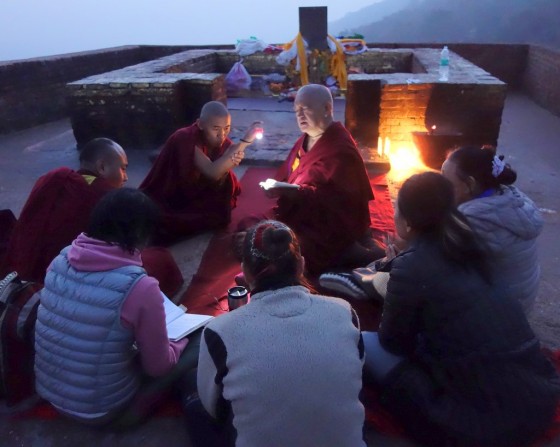
Lama Zopa Rinpoche teaching into the evening on Vulture’s Peak, Bihar, India, February 2014. Photo by Ven. Roger Kunsang.
The Lama Yeshe Wisdom Archive makes available transcripts of Lama Zopa Rinpoche’s teachings at the annual month-long Kopan courses going back to the first years of the course. The following is an excerpt from the 15th Kopan course, given in 1982. Here Rinpoche offers instruction on the Heart Sutra:
“It says in the Heart Sutra, ‘There is no this and that,’ saying so many ‘no’s.’ Sometimes when you meditate like this, sometimes meditate that yourself, the ‘I,’ the listener to the teaching, and the aggregates, the general and particular aggregates and the objects of the senses, are merely labeled. And then sometimes, as you hear the words, look at them. As you hear the words, whatever appears to your ‘I,’ your aggregates, your parts – the eyes, nose, those parts – without the mind wandering, as you hear the words, look at the appearance of your own particular aggregates, your own object of the senses. Also, you can think of others. Think where it says ‘no,’ ‘no,’ ‘no;’ apply that to this – on the thing that appears to your mind, apply the word ‘no.’
“Think, ‘All this is illusory.’ Like when you have taken LSD, you get visions of mandalas or going to the planets, and then at the same time the mind is aware that it is not real, it is just a hallucination. Similarly, while you are dreaming, at the same time, you are conscious of the dream, you recognized that this is a dream. Similar to this. At least you can meditate sometimes in this way.
“Then each time you do like this, it plants seeds, and the mind gets trained and can soon realize the meaning of emptiness, the absolute nature, the emptiness that is so much emphasized in Buddhadharma. It is emphasized so much how important it is to realize – there are so many volumes of teachings that explain about it in detail. There are the root texts and so many commentaries written by many realized lamas and by Indian pandits. So, soon that experience comes. What is in the books, what you talk about in the teachings, what you meditate on, becomes real. In other words, it becomes reality. Now it is just words, you know, imitating – when we are meditating, we are imitating, just repeating the words. It is like this in reality, but we don’t see it in this way. So now, one doesn’t see it as a reality for one’s own mind, as a kind of philosophy, but something that you cannot feel, or something that has no relation to the fact of existence. However, at that time, when the understanding and experience comes in your mind, it becomes normal reality, it becomes reality for your mind. Then in this way, one can be swiftly liberated from all the true suffering and the true cause of suffering.”
Visit the Archive to read the complete transcript.
Learn more about Lama Zopa Rinpoche, spiritual director of the Foundation for the Preservation of Mahayana Tradition (FPMT), and Rinpoche’s vision for a better world. Sign up to receive news and updates.
- Tagged: heart sutra, lama zopa rinpoche
- 0
3
Rejoice!
“First I want to say numberless thanks to all the FPMT family for your continual dedication and study, and for all your effort put into developing the centers by improving the conditions to receive teachers so that sentient beings can receive teachings, as well as all the FPMT projects and services that benefit sentient beings in so many different ways,” FPMT spiritual director Lama Zopa Rinpoche wrote in the FPMT Annual Review 2013. “It’s amazing, really fantastic. Thank you very, very much. Because of this, more and more good results have been happening and we have been able to bring greater benefit to others. This is something we can all see, enjoy and rejoice in. …”
You can read all of Rinpoche’s inspirational letter to the FPMT family in the just published FPMT Annual Review 2013 “Please Rejoice with Us.”
Lama Zopa Rinpoche is the spiritual director of the Foundation for the Preservation of Mahayana Tradition (FPMT), an organization dedicated to preserving Mahayana Buddhism through offering the Buddha’s authentic teachings and to facilitating reflection, meditation, practice and the opportunity to actualize and directly experience the Buddha’s teachings. Sign up to receive news and updates.
- Tagged: annual review, mandala
- 0
- Home
- News/Media
- Study & Practice
- About FPMT Education Services
- Latest News
- Programs
- New to Buddhism?
- Buddhist Mind Science: Activating Your Potential
- Heart Advice for Death and Dying
- Discovering Buddhism
- Living in the Path
- Exploring Buddhism
- FPMT Basic Program
- FPMT Masters Program
- FPMT In-Depth Meditation Training
- Maitripa College
- Lotsawa Rinchen Zangpo Translator Program
- Universal Education for Compassion & Wisdom
- Online Learning Center
- Prayers & Practice Materials
- Overview of Prayers & Practices
- Full Catalogue of Prayers & Practice Materials
- Explore Popular Topics
- Benefiting Animals
- Chenrezig Resources
- Death & Dying Resources
- Lama Chopa (Guru Puja)
- Lama Zopa Rinpoche: Compendium of Precious Instructions
- Lama Zopa Rinpoche: Life Practice Advice
- Lama Zopa Rinpoche Practice Series
- Lamrim Resources
- Mantras
- Prayer Book Updates
- Purification Practices
- Sutras
- Thought Transformation (Lojong)
- Audio Materials
- Dharma Dates – Tibetan Calendar
- Translation Services
- Publishing Services
- Teachings and Advice
- Find Teachings and Advice
- Lama Zopa Rinpoche Advice Page
- Lama Zopa Rinpoche: Compendium of Precious Instructions
- Lama Zopa Rinpoche Video Teachings
- ༧སྐྱབས་རྗེ་བཟོད་པ་རིན་པོ་ཆེ་མཆོག་ནས་སྩལ་བའི་བཀའ་སློབ་བརྙན་འཕྲིན།
- Podcasts
- Lama Yeshe Wisdom Archive
- Buddhism FAQ
- Dharma for Young People
- Resources on Holy Objects
- Ways to Offer Support
- Centers
- Affiliates Area
- Teachers
- Projects
- Charitable Projects
- Make a Donation
- Applying for Grants
- News about Projects
- Other Projects within FPMT
- Support International Office
- Projects Photo Galleries
- Give Where Most Needed
- FPMT
- Shop
Subscribe to FPMT News
Translate*
*powered by Google TranslateTranslation of pages on fpmt.org is performed by Google Translate, a third party service which FPMT has no control over. The service provides automated computer translations that are only an approximation of the websites' original content. The translations should not be considered exact and only used as a rough guide.By eliminating the self-pitying imagination of ego, you go beyond fear. All fear and other self-pitying emotions come from holding a self-pitying image of yourself.






